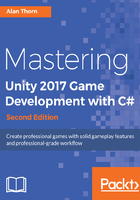
Preparation and Asset Configuring
Greetings, and welcome to this comprehensive and detailed exploration of Unity 2017 that carefully examines how we take a game project from conception to completion. Here, we'll pay special attention to the best-practice workflows, design elegance, and technical excellence. The project to be created will be a first-person cinematic shooter game, for desktop computers and mobile devices, inspired by Typing of the Dead (https://en.wikipedia.org/wiki/The_Typing_of_the_Dead). Our game will be called Dead Keys (hereon abbreviated as DK). In DK, the player continually confronts evil flesh-eating zombies, and the only way to eliminate them safely is to complete a set of typing exercises, using either the physical keyboard or a virtual keyboard. Each zombie, when they appear, may attack the player and is associated with a single word or phrase chosen randomly from a dictionary. The chosen phrase is presented clearly as a GUI label above the zombie's head. In response, the player must type the matching word in correct and full words, letter by letter, to eliminate the zombie. If the player completes the word or phrase without error, the zombie is destroyed. If the player makes a mistake, such as pressing the wrong letter in the wrong order, then they must repeat the typing sequence from the beginning.
This challenge may initially sound simple for the player, but longer words and phrases naturally give zombies a longer lifespan and greater opportunities for attacking. The player inevitably has limited health and will die if their health falls below 0. The objective of the player, therefore, is to defeat all zombies and reach the end of the level. Here's an illustration of the game:

Creating the word-shooter project involves many technical challenges, both 3D and 2D, and together, these make extensive use of Unity and its expansive feature set. For this reason, it's worth spending some time exploring what you'll see in this book and why. This book is a Mastering title, namely Mastering Unity 2017, and the word Mastering carries important expectations about excellence and complexity. These expectations vary significantly across people, because people hold different ideas about what mastery truly means. Some think mastery is about learning one specific skill and becoming very good at it, such as mastery in scripting, lighting, or animation. These are, of course, legitimate understandings of mastery. However, others see mastery more holistically, and this view is no less legitimate. It's the idea that mastery consists of cultivating a general, overarching knowledge of many different skills and disciplines, but in a special way by seeing a relationship between them and seeing them as complementary parts that work together to produce sophisticated and masterful results. This is a second and equally legitimate understanding of the term, and it's the one that forms the foundation for this book.
This book is about using Unity generally as a holistic tool--seeing its many features come together, as one unit, from level editing and scripting to lighting, design, and animation. For this reason, our journey will inevitably lead us to many areas of development, and not just coding. Thus, if you're seeking a book solely about coding, check out the Packt title on Mastering Unity Scripting. In any case, this book, being about mastery, will not focus on fundamental concepts and basic operations. It already assumes that you can build basic levels using the level editor and can create basic materials and some basic script files using C#. Though this book may at times include some extra, basic information as a refresher and also to add context, it won't enter into detailed explanations about basic concepts, which are covered amply in other titles. Entry-level titles from Packt include Unity 5.x By Example, Learning C# by Developing Games with Unity 5.x, and Unity Animation Essentials. This book, however, assumes that you have a basic literacy in Unity and want to push your skills to the next level, developing a masterful hand for building Unity games across the board.
So, with that said, let's jump in and make our game!